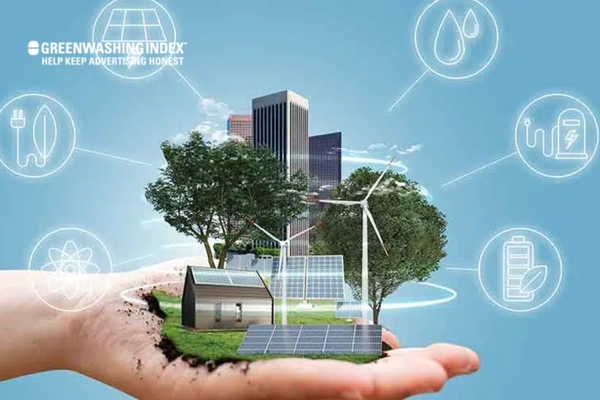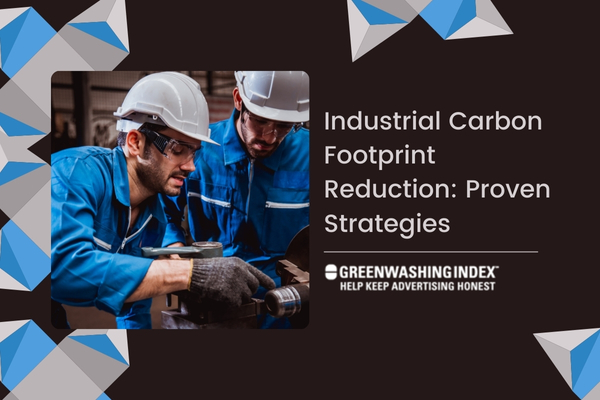Imagine a world where the air is clear, the water is pure, and nature thrives – it’s not just a dream! As businesses, we hold the key to this future through our choices and actions. Industrial carbon footprint reduction isn’t only about following trends; it’s about creating a legacy of healthier environments and sustainable practices. Each step we take towards greening industries can lead to this vibrant vision coming true.
What if I told you that your business could save money while saving the planet? That’s right, industrial carbon footprint reduction isn’t just good for the earth – it’s great for your bottom line, too!
By adopting simple strategies like improving energy efficiency and incorporating renewable energy resources, companies can significantly slash their carbon emissions. These actions aren’t just responsible moves for our planet; they’re smart business choices that can lead to lower operational costs and improved brand reputation.
Unlocking Insights on Eco-Friendly Business
- Discover easy ways to cut down energy usage
- Learn how renewable energy benefits industries
- Unveil tech innovations for greener production
- Gain insights on profitable green transformations
- Find out about supportive government policies
Embracing Industrial Eco-friendliness

As we all live and work on this planet, it’s become more and more obvious that industries need to think seriously about how they affect the environment. That’s why I want to talk about greening industries – changing them to harm the environment less while still doing their jobs well. Let’s dive into why this is urgent and what good things can come from it.
The Urgency of Eco-Friendly Changes
As someone who is mindful of our planet, I’ve come to realize the importance of industries making a shift towards more environmentally friendly operations. The reason why this is so critical is because industries play a huge role in the health of our environment. They use large amounts of energy and materials, which often leads to significant carbon emissions and other types of pollution.
Climate change is a serious challenge facing us all. It’s causing extreme weather, harming wildlife, and affecting human health. Industries must reduce their carbon footprint – that means they need to make less carbon dioxide go into the air when they make products or use energy.
It’s not just about protecting nature, though—there are rules now that limit pollution and customers want products that don’t harm the earth. If industries don’t change their ways, they could pay penalties or lose business to greener competitors.
Moreover, resources like oil and gas won’t last forever, so it makes sense for businesses to use less and find new ways that are better for our planet. Sooner or later, everyone will have to make changes—industries might as well start now and lead the way!
Benefits of Industrial Eco-friendliness
Making these eco-friendly changes isn’t only about doing good; it actually brings many benefits, too! Let me outline them simply:
- Lower Costs: By improving industrial energy efficiency, companies can save money on power bills. Plus, using fewer materials cuts down on spending.
- Less Waste: When industries focus on being eco-friendly, they also produce less waste—which can save space and money.
- Healthier Workplace: A greener industry often means cleaner air inside factories, which is better for workers’ health.
- New Business Opportunities: Companies that adopt sustainable business practices might find new ways to make money by selling recycled materials or offering green services.
- Better Image: Businesses that care about the environment have a good image in society—people respect them more, which can earn them more loyal customers.
- Future-Ready: Regulations around pollution are getting stricter everywhere—industries that go green now won’t have trouble meeting these new rules in the future.
- Staying Competitive: As consumers become more aware of environmental issues, there’s a growing demand for eco-friendly products—a green company stays ahead in this market trend.
By focusing on industrial carbon footprint reduction through sustainable practices like recycling and using renewable energy sources instead of fossil fuels – companies not only contribute positively towards combating climate change but also improve their bottom line over time.
So yes, eco-friendliness within industry walls carries weighty reasons brimming with urgency – it’s an investment into both the earth’s longevity as well as commerce vitality!
In a world that’s waking up to the importance of preserving our environment, it’s vital for industries to step up and play their part by adopting more sustainable business practices. Let’s dive into some concrete steps that industries can take to minimize their carbon footprint and contribute positively.
Also Read: Old Electronics Disposal: Ultimate Recycling Tips Guide
Steps Towards Industrial Eco-Friendliness

In a world that’s waking up to the importance of preserving our environment, it’s vital for industries to step up and play their part by adopting more sustainable business practices. Let’s dive into some concrete steps that industries can take to minimize their carbon footprint and contribute positively.
Reducing Energy Consumption
As industries look to reduce their carbon footprint, one of the most effective steps they can take is to cut back on energy use. There are several ways businesses can achieve this and become more eco-friendly:
- Optimize machine use: Turning off machines when not in use is a good start. Setting up an automated system that shuts down equipment during downtime could save a significant amount of energy.
- Regular maintenance: Keeping machines well-maintained means they run more efficiently, using less power. Regular check-ups should be part of any industrial company’s routine.
- Energy-efficient lighting: Swap old, outdated bulbs for LED or other low-energy variants, which substantially reduce electricity usage over time.
- Insulation: Properly insulating factory walls and ceilings can help maintain temperatures inside buildings, either warm or cool, reducing the need for heating or air conditioning.
- Upgrade Equipment: Older machinery can drain a lot of power. Investing in modern, energy-efficient models saves energy and often increases productivity.
- Employee training: Ensuring all staff members are aware of the importance of saving energy and knowing how to do it could lead to big changes.
Through these strategies, industries aim to achieve industrial carbon footprint reduction by consuming less power overall and promoting a culture of eco-friendliness.
Implementing Renewable Energy Sources
Another key area where industries can make substantial improvements in their environmental impact is by incorporating renewable energy sources into their operations:
- Solar panels: Installing solar panels on factory rooftops can significantly lower reliance on fossil fuels by harnessing the sun’s power to generate electricity.
- Wind turbines: If located in a windy region, companies might consider erecting wind turbines to produce clean, green power that reduces their reliance on conventional energy sources.
- Geothermal systems: For industries that require constant heating or cooling throughout the year, geothermal systems utilize the stable temperatures underground to regulate building temperatures more efficiently than traditional HVAC systems.
- Biomass boilers: Some factories could switch from oil or gas boilers to biomass ones that burn waste wood chips or pellets – this is often considered carbon-neutral because trees absorb CO2 as they grow, which offsets emissions from burning the pellets later on.
- Purchase green energy: Even if installing renewable infrastructure isn’t immediately feasible due to space or budget constraints, purchasing electricity from renewable sources through green tariffs can contribute towards industrial carbon footprint reduction.
By integrating these sustainable sources into daily practices, businesses would not just cut down costs in the long run but also align themselves with sustainable business practices aimed at creating carbon-neutral industrial processes and securing an environmentally sound future for all industries involved.
Also Read: Composting Chicken Bones: Your Complete How-To Guide
The Role Of Technology In Promoting Industrial Eco-Friendliness

As I look around, it’s clear that technology plays a huge role in making factories and industries more friendly to the Earth. When we talk about industrial carbon footprint reduction, we are really talking about using new tools and machines that help us make things without harming our planet as much.
Innovative Technologies for Green Production
So let me share some cool tech stuff that is making a big impact:
- Renewable Energy Systems: Okay, this one is big. Industries are now using energy from the sun, wind, and water instead of coal or oil. This switch means they add much less bad stuff into the air – you know, like carbon dioxide which makes our planet warmer.
- Energy-Efficient Equipment: Next up is smarter machines that use less power to do their job. Think of them like light bulbs that give you the same amount of light but lower your electric bill. This is super good because it means industries need less electricity and cause fewer problems for Mother Nature.
- Circular Economy Tech: Here’s an interesting one – instead of throwing stuff away after they’re used once (which wastes materials and energy), industries now try to reuse things as much as possible or turn waste into something new with special technologies! It’s like giving products multiple lives so we don’t have to take as much from Earth.
- Carbon Capture: Sounds like a sci-fi movie, right? But it’s real! Some factories can now grab the carbon they produce before it escapes into the air and store it safely away or even turn it into useful things.
- Smart Sensors and AI: Little gadgets called sensors are combined with brainy computer programs (AI) to watch how machines work very closely. They can tell when something needs fixing or when there’s a way to do a task with less energy being used.
These innovations are changing how things are made in a way that looks out for our planet’s health.
Smart Manufacturing For Carbon Emission Reduction
Now, let’s get even more techy by discussing smart manufacturing:
- Automated Processes: Robots don’t need lights on all day or air conditioning; plus, they make fewer mistakes than people – which means they can save lots of energy as they work non-stop on assembling cars, gadgets, etc.
- Predictive Maintenance: By predicting when a machine will need some TLC before breaking down (using clever software), repairs can be done quickly without wasting time or extra resources – leading to reduced emissions since everything runs smoothly without extra effort.
- 3D printing cuts down on waste by making parts layer-by-layer only where needed rather than carving them out from big chunks of material; this also means transporting lighter items, which equals less fuel burn if you’re moving them around!
All these smart manufacturing methods keep an eye on lowering carbon emissions while still making cool stuff efficiently, combining brains with care for nature!
So there you have it: amazing ways technology is transforming industries, so we all leave smaller footprints on our precious Earth while keeping our lives running smoothly.
Case Studies on Successful Implementation of Industrial Eco-Friendly Actions

When we talk about industrial carbon footprint reduction, it’s important to look at case studies where companies have successfully turned things around for the better. These stories can show us that making industries greener is not only possible but also beneficial.
Overcoming Challenges In Transition
Implementing sustainable business practices can be tough. It’s like trying to fix a running car. But some companies have managed to do it really well.
A Big Tech Company: Turning Waste Heat Into Energy
This one tech giant faced challenges transitioning to carbon-neutral industrial processes. They had lots of computers which produced heat, like a small sun! What did they do with the heat? They didn’t want it just floating away in the air. So, they invented a cool system that grabs the heat before it escapes and uses it to warm up offices and homes nearby. Smart, right?
But how did they overcome hurdles?
- Big Plan: Firstly, they planned everything down to the tiniest detail.
- Teamwork: Then, they got everyone on board—from the managers to the employees who had to learn new ways of doing things.
- Local Help: They worked closely with local governments and communities because switching things up affects everyone.
A Manufacturing Giant: From Wasting Water To Saving Drops
Another success story comes from a company that makes stuff (let’s say cars). Cars need lots of water during production – kind of like giving them baths before sending them off! The problem was that too much water was being wasted.
The Shift:
- Measuring: They started measuring every drop of water.
- Recycling: Next step? Recycling water so they could use less fresh water.
- Closing Loops: No more in one end and out the other; everything circulates inside their system now.
They stumbled into problems at first—recycling tech wasn’t cheap, and changing old habits takes time—but their determination kept them going until success!
Profitability Post-Implementation
Let’s face it – money talks! Here’s how these green changes made bank for companies:
The Tech Company Heating Things Up
Post-transition, their bills went down because heating buildings using waste heat is cheaper than buying energy from outside sources. And guess what? People liked buying from a company helping the environment—it was good for their image!
- Lower Energy Costs: Fewer expenses on energy meant more money saved.
- Brand Image Boost: Their “green” moves attracted customers who cared about Earth, too.
- Innovation Leadership: Becoming industry leaders in innovation resulted in even more business coming their way.
So, green changes filled up not only their environmental brownie points jar but also their wallets!
The Car Maker That Turned Off The Tap Just Right
After implementing industrial energy efficiency measures regarding water usage:
- Decreased Operational Costs: Less money spent on water means lower costs when making cars—and lower prices can attract more buyers!
- Reduced Risk & Increased Security: Less dependence on outside water sources means if something goes wrong out there (like drought), this company is cool as a cucumber cause they recycle what they have got!
- An Attractive Brand for Investors & Customers Like Sustainable business practices make people want to invest in such smart companies or buy from them—more investors = more cash + happy customers = increased sales!
In both cases—and many others like these—the switch may seem rocky at first (like trying new food), but once done right, becoming eco-friendlier isn’t just good for our big home (Earth); it also makes sense money-wise!
Also Read: Eco-Friendly Dishwashing: Save Water and Protect Earth
Encouraging Wider Adoption Of Industrial Eco-friendly Practices

Industries around the world are starting to understand that going green is not just good for the Earth but also for business. But how can we get even more industries to join in and reduce their carbon footprint? This is a question I think about often.
Government Policies And Support
When it comes to encouraging greener industrial practices, governments play a key role. They hold the power to make rules that push industries towards being more friendly to the environment. Here’s what I think can be done by governments around the world to support this shift:
- Offer Tax Incentives: Governments can give tax breaks or other financial perks to businesses that lower their carbon output. This makes it more attractive for companies to invest in greener tech and processes.
- Invest in Research: Funding research into sustainable technology can lead to breakthroughs. This could help make cutting down on industrial carbon footprint reduction much simpler and cheaper.
- Set Clear Rules: Clear regulations need to be set up so industries know what they must do. They need targets that challenge them but are still achievable.
- Educate Companies: Sometimes, companies might not know where to start with going green. Governments can offer training or resources on how best to reduce emissions.
- Support with Infrastructure: Setting up things like renewable energy sources (like wind farms or solar panels) helps industries switch over from using fossil fuels.
This kind of government support looks beyond just telling companies what not to do; it actually helps them move towards cleaner operations.
Prepping for the Future: The Long-Term Necessity of Industrial Eco-Friendliness
Thinking about future times, preparing now for stricter environmental laws makes sense for industries. Here’s why:
- Avoiding Fines and Penalties: If a company is already following tough eco-rules, they won’t have trouble when new laws come out. It saves them from paying fines.
- Meeting Customer Demand: Customers care more about the environment now than ever before. So, companies that are green might be preferred over those that aren’t.
- Getting Ahead of Competitors: If you start reducing your industrial carbon footprint now, you might get ahead of other companies that are slower to change.
By adopting sustainable business practices early, companies ensure they’re not scrambling later when tougher laws are put in place against pollution and waste.
So, as I see it, getting greener isn’t just good for our planet—it’s also smart business! It takes forward-thinking leadership but with clear benefits down the line both for nature and industry itself.
FAQs
What are some immediate steps an industry can take towards eco-friendliness?
An industry should focus on ways to be more energy efficient and reduce waste. Simple steps like turning off lights when not in use, recycling materials, and using less water make a big difference.
Why should companies care about being ‘green’?
Companies need to be ‘green’ because it saves money in the long run, reflects well on their reputation, and is better for the health of our planet. Everyone wins when businesses act responsibly.
How can a company measure its carbon footprint?
A company measures its carbon footprint by adding up all emissions from its operations. This includes energy used, waste produced, and gases released. Tools and professionals can help with the calculations.
Conclusion
In the journey to address climate change, industries embracing eco-friendly practices is a monumental stride forward. The push for industrial carbon footprint reduction not only shields our environment but also steers businesses toward sustainable growth and longevity. It’s vital that industrial sectors acknowledge their role in the global ecological narrative and take proactive steps in energy efficiency and sustainable business practices.
As they engage in this green revolution, industries magnify their prestige, increase financial gains, and contribute positively on a global scale. Though challenges are inevitable during transition phases, resilience can fruitfully transform operations into models of green excellence that inspire widespread change.
Key Takeaway Points:
- Embracing carbon-neutral industrial processes is critical for environmental sustainability.
- Industrial eco-friendliness yields monetary and social benefits.
- Steps like reducing energy consumption and using renewable sources are essential for footprint reduction.
- Technological advancements support significant strides in industrial energy efficiency.
- Success stories highlight the feasibility of overcoming challenges in adopting sustainable business practices.
- Government policies play a pivotal role, but long-term vision is key for future readiness.




